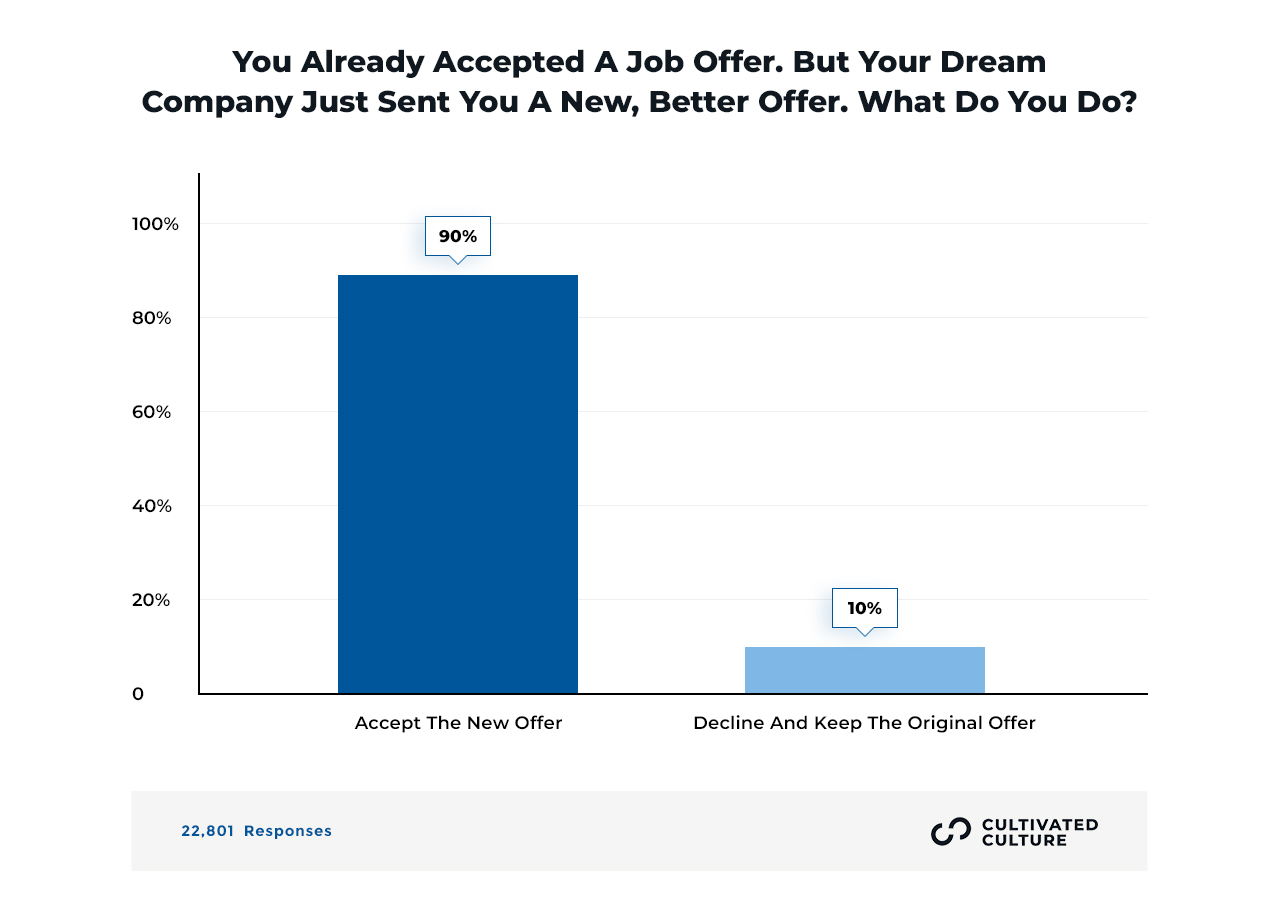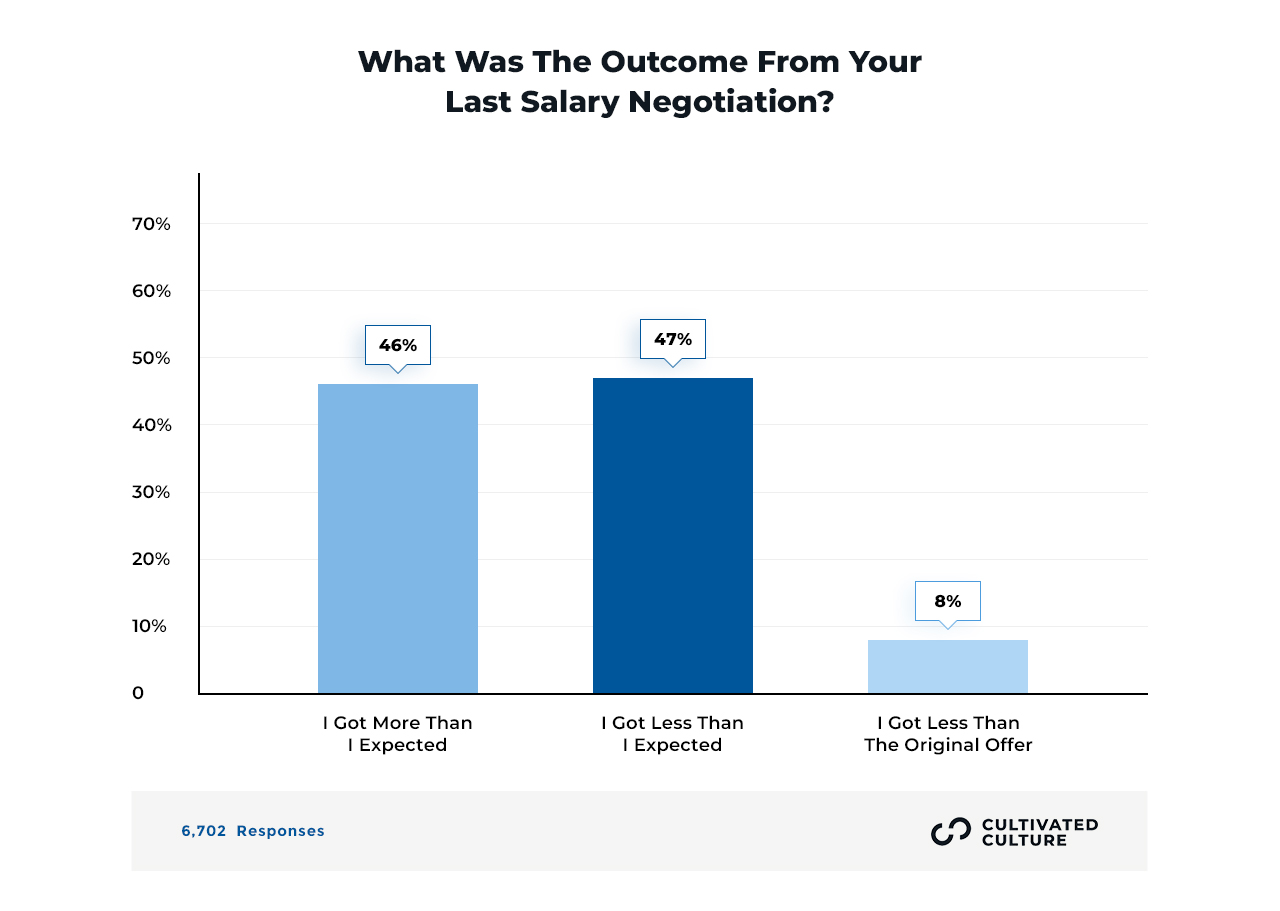Score! You just got a job offer!
But…
You're also still interviewing for another company.
And they're top priority on your list.
What to do?
When you've dedicated weeks, or even months to the job search, situations like these might occur. The timing won't always be in your favor.
But you don't have to accept the first offer and walk away from the opportunity you really want. Neither do you have to take your chances and decline the first offer hoping all will turn out for the best with your dream job, because… it might not.
Instead, you might consider accepting the first offer and keep interviewing for your desired role at another company.
Yup, you read it.
If you think this is all too absurd, think again. Just look at the data from this LinkedIn Poll with 22,800+ voters who were asked if they'd accept a new, better offer after already accepting another offer:
That's right — 90% said they would accept the new offer.
So, why shouldn't you?
Don't panic, though! We're here to walk you through the process.
What To Do When You've Received A Job Offer While Still Interviewing
First off, I want to remind you that, although this situation can cause a lot of anxiety, this is a good problem to face. You've got a job offer and you're still being considered for another role. Give yourself a pat on the back here, you deserve it!
Second, it's worth acknowledging that getting a job offer while still interviewing for a role at another company can be a delicate situation — if it weren't, Reddit and Quora wouldn't be filled with tons of queries asking for advice on how to handle this situation.
You'll need to gear up all your emotional intelligence to keep it cool. So, before you go doing anything crazy, you'll:
1. Analyze The First Offer
Analyze all the details of the first offer, like base salary, bonuses, equity, and benefits.
Does everything match your expectations?
If it doesn't, you can buy some time with a salary negotiation (which you should do, either way, not only to buy time). This can give you an extra day or two to keep interviewing for your desired role.
After analyzing the final offer, you can still…
2. Ask For A Couple Of Days To Think
There's nothing wrong with asking for a couple of extra days to think about the offer.
After all, you might have spent:
- 20+ minutes uploading your resume
- 50+ minutes answering questions in an interview
- 4+ weeks going on multiple interview rounds
- 2+ hours on assessments
That's so much time proving you're the best fit for the role. So why shouldn't you ask for a few days to decide if the company is a good fit for you?
Ask the company what's their deadline for an answer. Then ask if it would be okay to extend the deadline by a couple more days.
If that doesn't buy you enough time, then you might want to…
3. Accept The First Offer
As a job seeker, you are the CEO of your life and your career. Meaning your job is to make sure you have all of the information, analyze it thoroughly, and make the best decision for you.
If you've already analyzed the offer, negotiated, and thought through it, you might want to accept the first offer, because:
- You can't be 100% sure your top priority will extend you the offer.
- Even if they do, the offer might not be as good (even after negotiating) — and suddenly your top priority might not be that interesting, after all.
In other words, you might be taking a big risk by not accepting the first offer. And, just like a CEO for any of the companies you're targeting, you should assess your risks before making any decisions.
4. Continue Interviewing For Your Top Priority
So, we know that declining the first offer can be risky.
But dropping out of the interview process for your top priority is a risk, too.
You might be risking:
- An amazing job opportunity
- Your work-life balance
- A better pay
- And so much more!
If you don't get the role, you'll still have a great option to fall back.
But what if you do get the role?
In this case, you'll:
5. Analyze, Negotiate, And Think About It
In other words: you'll repeat the same process you did for Company #1.
That includes negotiating your salary, by the way. That same data I mentioned early on in this article showed that 93% of candidates who negotiated their salary got more than the original offer:
After you've got a final offer, then you can make the best decision for yourself.
💡 Pro Tip: Check out our article “How To Negotiate Salary: 7 Winning Strategies From 93,000+ LinkedIn Data Points” to nail your salary negotiation.
That could still be sticking with Company #2…
Or it could be rescinding the offer from Company #1 offer and going with your top choice.
Now, you might ask yourself:
“Won't I Be Burning Bridges By Turning Down An Offer I Just Accepted?”
Most people might feel discomfort by turning down a job offer they've just accepted because they've given the company their word, and they feel like they'll be burning bridges by doing so.
And that might actually be the case.
But, on the other hand…
Have you ever seen a company save someone from a layoff because they passed over their dream job to “keep their word”?
One quarter, there's a keynote about how “we're a family.” The next quarter, layoffs.
CEOs won't hesitate to remove emotion from the equation and make the best decision for them.
You shouldn't either
If you got a job offer while still interviewing…
Just keep interviewing.





































